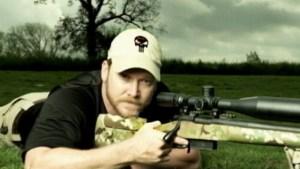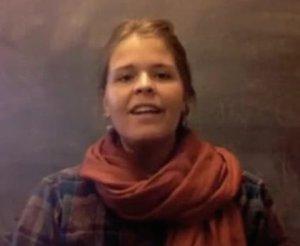 By Alan Bean
By Alan Bean
There is Kayla Mueller’s America and there is Chris Kyle’s America and we can’t identify with both. There is Kayla Mueller’s Christianity and Chris Kyle’s Christianity and the two religions have little in common. Kyle or Kayla; who’s your hero?
Kayla Mueller was taken captive by ISIS militants while working with Doctors Without Borders (Médecins Sans Frontières) in a hospital dedicated to treating refugees from Syria’s civil war. This was how she lived out her faith. Earlier faith adventures took Mueller to India, Israel and Palestine.
 Mueller traveled to Israel in 2010 to work with African immigrants but spent most of her time working with the pro-Palestinian International Solidarity Movement. Mueller later reflected on this experience in a blog post.
Mueller traveled to Israel in 2010 to work with African immigrants but spent most of her time working with the pro-Palestinian International Solidarity Movement. Mueller later reflected on this experience in a blog post.
“I could tell a few stories about sleeping in front of half demolished buildings waiting for the one night when the bulldozers come to finish them off; fearing sleep because you don’t know what could wake you…. I could tell a few stories about walking children home from school because settlers next door are keen to throw stones, threaten and curse at them.”
“The smell and taste of tear gas has lodged itself in the pores of my throat and the skin around my nose, mouth and eyes. It still burns when I close them. It still hangs in the air like invisible fire burning the oxygen I breathe. When I cry tears for this land, my eyes still sting. This land that is beautiful as the poetry of the mystics. This land with the people whose hearts are more expansive than any wall that any man could ever build.”
In the eyes of many, Kayla Mueller’s sympathy for the Palestinian people defined her as anti-Israel and anti-American. Such conclusions make sense from the perspective of Chris Kyle Christianity.
I haven’t read Kyle’s book, American Sniper: The Autobiography of the Most Lethal Sniper in U.S. Military History, nor have I seen Clint Eastwood’s movie. Chris Hedges read the book and watched the film and came away horrified.
Kyle was given the nickname “Legend.” He got a tattoo of a Crusader cross on his arm. “I wanted everyone to know I was a Christian. I had it put in red, for blood. I hated the damn savages I’d been fighting,” he wrote. “I always will.” Following a day of sniping, after killing perhaps as many as six people, he would go back to his barracks to spent his time smoking Cuban Romeo y Julieta No. 3 cigars and “playing video games, watching porn and working out.” On leave, something omitted in the movie, he was frequently arrested for drunken bar fights. He dismissed politicians, hated the press and disdained superior officers, exalting only the comradeship of warriors. His memoir glorifies white, “Christian” supremacy and war. It is an angry tirade directed against anyone who questions the military’s elite, professional killers.
“For some reason, a lot of people back home—not all people—didn’t accept that we were at war,” he wrote. “They didn’t accept that war means death, violent death, most times. A lot of people, not just politicians, wanted to impose ridiculous fantasies on us, hold us to some standard of behavior that no human being could maintain.”
Chris Kyle has a point. It is unrealistic to expose young men to pro-military propaganda, send them to boot camp, hand them a rifle, tell them to kill citizens of a demonized race, and then criticize them for joking about mass murder. War does mean “violent death”. And repeated exposure to violent death destroys the spirit. This is particularly true when you are personally responsible for the violence and death.
Military veterans deal with the spiritual damage of war in different ways. Some end up on the streets. Some, like the tormented vet who gunned Kyle down at a shooting range, veer into madness. Kyle dealt with the trauma of war by creating a version of Christianity featuring a mirror image denial of everything Jesus did and taught: a bizarre blend of white, middle class, hearth-and-home sentimentality and a Manichean dualism driven by hatred of the “other” and a joyful (and uniquely American) embrace of violence, pornography, machismo, hatred and death. (If you think I’m exaggerating here, please read Hedges’ review of American Sniper, book and movie.)
Kayla Mueller’s Christianity flowed from the gospel of the kingdom that sent Jesus to his cross. The oft-quoted words from her prison cell are twenty-first century Dietrich Bonhoeffer (you can read the hand-written letter in its entirety here):
“I remember mom always telling me that all in all in the end the only one you really have is God. I have come to a place in experience where, in every sense of the word, I have surrendered myself to our creator b/c literally there was no else … + by God + by your prayers I have felt tenderly cradled in freefall.”
Will Hollywood make a movie about Kayla Mueller? Don’t hold your breath. As the box office success of American Sniper shows, Chris Kyle Christianity enjoys mass appeal. By contrast, Kayla Mueller Christianity reminds us that “the gate is narrow and the road is hard that leads to life, and there are few who find it.”
Kayla “tenderly cradled” the victims of violence; Kyle embodied the myth of redemptive violence. Kyle and Kayla can’t both be heroes; you’ve got to choose.
